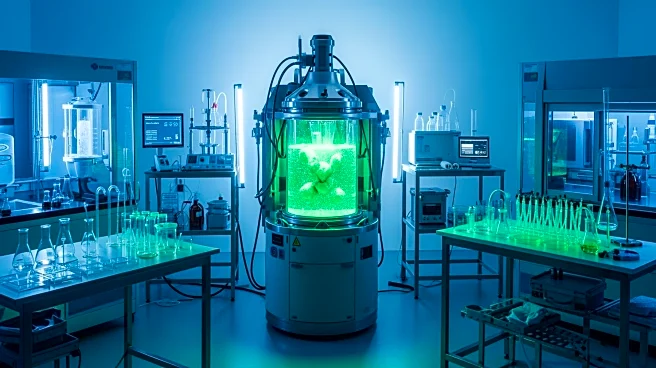What's Happening?
Lab-grown meat, also known as cultivated or cell-based meat, is produced by cultivating animal cells in a controlled laboratory environment. The process involves taking stem cells from a live animal, placing them in bioreactors with culture media, and
allowing them to differentiate into muscle, fat, and connective tissue. This innovative approach aims to produce meat without the need for raising and slaughtering animals, potentially increasing animal welfare. However, the process currently relies on fetal bovine serum, raising ethical concerns. Lab-grown meat offers improved food safety by reducing contamination risks associated with traditional meat production.
Why It's Important?
Lab-grown meat represents a significant advancement in food technology, offering a more sustainable and ethical alternative to traditional meat production. As the global population grows, the demand for protein is expected to increase, making sustainable production methods crucial. Lab-grown meat could reduce the environmental impact of meat production by using fewer resources and generating fewer emissions. Additionally, it addresses ethical concerns related to animal welfare, providing a cruelty-free option for meat consumption. The technology also has the potential to improve food safety by minimizing contamination risks.
What's Next?
The future of lab-grown meat depends on overcoming production challenges and gaining regulatory approval. As companies work to replace fetal bovine serum with non-animal growth media, lab-grown meat may become more appealing to vegetarians and vegans. Regulatory approval is necessary for commercialization, with the EU and other regions reviewing safety assessments. Consumer acceptance will be key to widespread adoption, with studies indicating reluctance but potential for increased acceptance through education and marketing. As the industry progresses, lab-grown meat could become a viable alternative to traditional meat, influencing dietary habits and food production practices.
Beyond the Headlines
Lab-grown meat raises questions about its suitability for vegetarians, vegans, and religious dietary restrictions. While some progress has been made in developing non-animal growth media, the technology's reliance on animal cells may still pose ethical dilemmas. Additionally, the environmental sustainability of lab-grown meat production remains uncertain, with concerns about energy consumption and CO2 emissions. As the industry evolves, it will need to address these challenges and demonstrate its benefits to gain consumer trust and acceptance.















